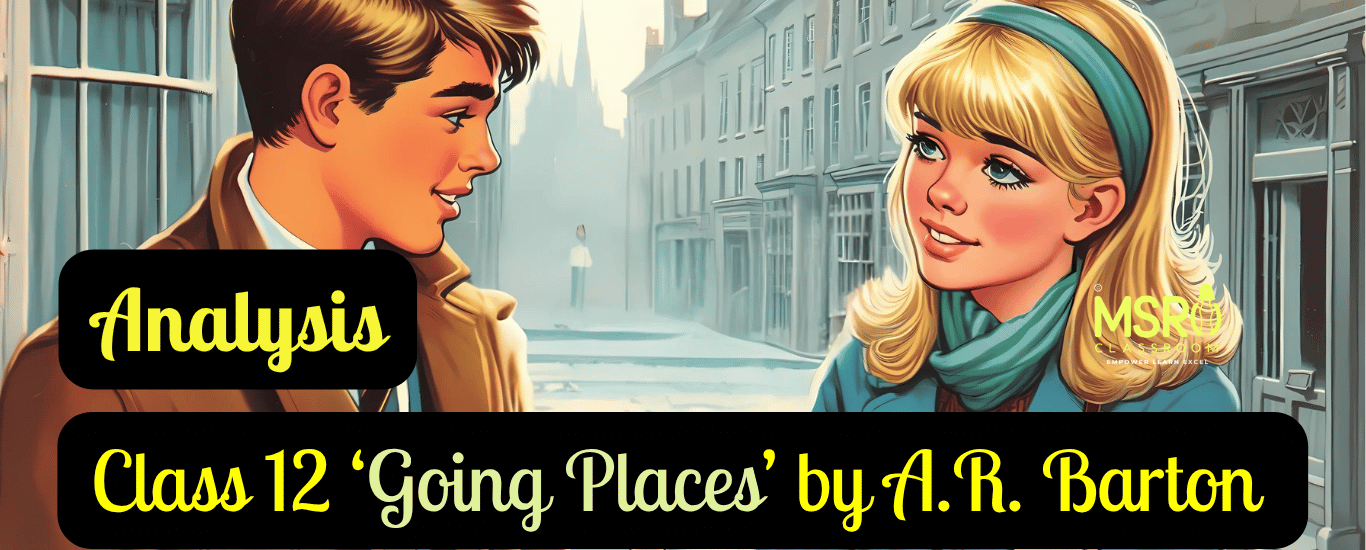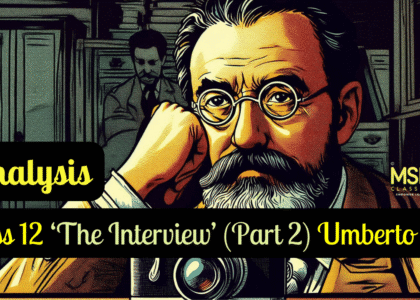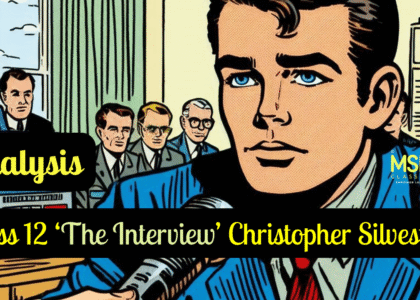Chapter 8, A.R. Barton’s ‘Going Places’ MCQs, Summary, Theme, Character Sketches, and Metaphorical Expressions, Question Answers.
Chapter 8- Going Places by A.R. Barton:
Table of Contents
Also Read: Class 12 Poem- “Aunt Jennifer’s Tigers” Complete Analysis , About the Author A.R. Barton
Summary ‘Going Places’ by A.R. Barton:
‘Going Places’ is a story about Sophie, a young girl from a working-class environment who dreams of a better life. Despite the practicalities voiced by her family and the scepticism of her friend, Sophie remains steadfast in her ambitions. She meets Danny Casey, a footballer, and is excited about the prospect of a glamorous life. However, when Casey doesn’t show up for their planned meeting, Sophie is disappointed but finds solace in the memory of their encounter. The story poignantly captures the disparity between dreams and reality, the longing for something more, and the power of hope and imagination in adversity.
Theme ‘Going Places’ by A.R. Barton:
- Adolescent Hero-Worship: The story ‘Going Places’ portrays adolescent hero-worship through protagonist Sophie’s admiration for a young football prodigy named Danny Casey. Her fascination with Casey borders on obsession, blinding her to the reality of his fame and the unlikelihood of their developing a significant relationship beyond a fleeting encounter.
Sophie’s character illustrates how adolescents idealise their idols, projecting their fantasies and desires onto them.
- Fantasising: Sophie’s vivid imagination and tendency to construct elaborate fantasies define her character, particularly regarding her encounter with Danny Casey. Her dreams reflect her desire to escape the confines of her working-class life and aspire to something greater. Sophie’s encounter with Danny Casey becomes a focal point of her fantasies, highlighting the power of imagination to provide solace and inspiration in the face of adversity.
The theme of fantasising in ‘Going Places’ highlights the importance of dreams and aspirations in the lives of adolescents, serving as a means of coping with the challenges of adolescence and envisioning a brighter future.
Explanation of A.R. Barton’s ‘Going Places’ for Auditory Learners:
Duration: 12 minutes
Chapters/time stamps with subtitles are available.
Character Sketch ‘Going Places’ by A.R. Barton:
1. Character Sketch of Sophie in “Going Places”:
- Sophie is a dreamer caught in the harsh reality of her working-class life. Despite her humble surroundings, she possesses a vibrant imagination and an unwavering determination to break free from the confines of her social status. From her aspirations of owning a boutique to her chance encounter with Danny Casey, Sophie yearns for a life beyond the ordinary.
- She is portrayed as a young woman with a rebellious spirit, willing to defy societal expectations and her family’s limitations. Sophie’s conversations with her friend Jansie and brother Geoff highlight her resilience and desire for something more. Her interactions with Danny Casey reflect her innocence, naivety, and longing for connection and recognition.
- Sophie’s introspective nature characterises her as she contemplates her future and grapples with the scepticism of those around her. Despite facing doubts and setbacks, she maintains a sense of hope and optimism, clinging to her dreams as a source of solace and inspiration.
Sophie is a complex character driven by ambition and curiosity. Her journey is marked by longing, disappointment, and fleeting glimpses of fulfilment as she pursues her aspirations.
2. Character Sketch of Jansie:
- Jansie is pragmatic and grounded, starkly different from her dreamy and ambitious friend Sophie. She exhibits a sense of practicality and realism in contrast to Sophie’s lofty aspirations. Jansie’s doubts about Sophie’s plans reflect her understanding of their socioeconomic reality, where dreams often collide with the harshness of everyday life.
- She is depicted as a loyal friend, often trying to bring Sophie back to earth when her dreams seem too far-fetched. Despite her doubts, Jansie genuinely cares for Sophie’s future, advising her to consider more realistic options given their circumstances.
- Jansie’s demeanour suggests a level-headedness and maturity beyond her years. She is observant, noting the challenges Sophie might face in achieving her ambitions and offering sensible advice. While she may not share Sophie’s grandiose dreams, Jansie’s steadfastness and practical outlook serve as a grounding force amidst Sophie’s flights of fancy.
Metaphorical Expressions in ‘Going Places’:
In ‘Going Places,’ employs several metaphorical expressions to convey deeper meanings and enhance the narrative. Here are some of them:
- “Money grows on trees”: Expression is used by Sophie’s father to express disbelief at Sophie’s ambitions of owning a boutique. It metaphorically implies that money is not easily obtained and that Sophie’s dreams may be unrealistic given their financial situation.
- “Words had to be prized out of him like stones out of the ground”: The metaphor describes Geoff’s reluctance to speak voluntarily. It implies that extracting information or conversation from Geoff is as tricky as removing stones from the ground, suggesting his taciturn nature and the effort required to engage him in dialogue.
- “The delicate-seeming bow and the crooked back”: The metaphor juxtaposes the delicate appearance of Sophie’s mother’s apron bow with the physical toll of her labour, symbolising the contrast between fragility and hardship in her life.
- “He sat frowning at the oily component he cradled in his hands, as though it were a small dumb animal and he was willing it to speak”: Here, the metaphor compares Geoff’s intense focus on the mechanical part to an attempt to communicate with a silent creature. It highlights Geoff’s deep concentration and the frustration of trying to understand or fix something.
- “She breathed more easily”: Expression conveys Sophie’s relief upon realising that Jansie doesn’t know the full extent of her encounter with Danny Casey. It metaphorically suggests a sense of emotional release and relaxation.
- “Resignation was no sudden thing”: The metaphor describes Sophie’s gradual acceptance of the likelihood that Danny Casey won’t meet her. It implies that resignation is a slow, incremental process rather than a sudden realisation.
- “And it is a hard burden to carry, this sadness”: Metaphor compares sadness to a heavy burden that Sophie must bear. It conveys the emotional weight and difficulty of dealing with disappointment and unfulfilled expectations.
- “His eyes are green, and when he looks straight at you, they seem to shimmer.”: Metaphorical description of Danny Casey’s eyes suggests their captivating and mesmerising quality. It implies that his gaze profoundly affects Sophie, evoking feelings of fascination and admiration.
- “His eyes are on the same level as your own.”: Metaphorical description of Danny Casey’s eye level suggests a sense of equality and connection between him and Sophie. It implies that despite his status as a soccer prodigy, he relates to her on a personal and human level.
- “The prodigy. The innocent genius”: Descriptors of Danny Casey are metaphors for his exceptional talent and youthful innocence. They convey the awe and admiration he inspires and the purity and naturalness of his skill.
- “And she saw it all again last Saturday — saw him ghost past the lumbering defenders.”: Metaphorical description of Danny Casey’s “ghosting past” defenders implies his extraordinary agility and speed on the soccer field. It evokes imagery of a spectral figure effortlessly eluding obstacles.
- “The explosion of sound as he struck it crisply into the goal”: Symbolic depiction of the crowd’s reaction to Danny Casey’s goal conveys the intensity and excitement of the moment. It suggests a sudden burst of energy and enthusiasm akin to an explosion.
- “Sophie felt a tightening in her throat”: Expression suggests Sophie’s emotional response to her surroundings or circumstances. It metaphorically conveys a feeling of constriction or difficulty in expressing her emotions, indicating her internal tension or apprehension.
- “If he keeps his head on his shoulders”: Metaphorical expression used by Sophie’s father to caution against the potential pitfalls Danny Casey might face if he remains level-headed and focused. Maintaining composure and making wise decisions are essential for success and stability.
- “On Saturday they made their weekly pilgrimage to the United”: Metaphorical expression likens the family’s routine of attending the soccer matches of their favourite team, United, to a religious pilgrimage. It implies a sense of devotion, tradition, and reverence for the game and the team, highlighting its significance in their lives.
Colloquial Expressions/ Colloquial Speech in ‘Going Places’:
The story ‘Going Places’ by A. R. Barton contains several examples of colloquial expressions and teenage slang. Here are a few:
- Soaf: This is an informal nickname for Sophie used by her friend Jansie.
- Right old row: Sophie mentions that there would be a “right old row” if her dad found out about her encounter with Danny Casey. “Row” is a British slang term for a loud argument or quarrel.
- Christ: Geoff uses “Christ” as an exclamation, a common interjection in colloquial English.
- Loads of people: Sophie’s father mentions “queues of people round our house,” using “loads of people” as a colloquial expression for many individuals.
- What’s all this about Danny Casey?: This phrase reflects the casual, colloquial language Sophie uses to convey the idea of people asking about her encounter with Danny Casey.
- A load of trouble: Geoff warns Sophie that she might “talk [herself] into a load of trouble,” using the phrase “a load of trouble” colloquially to mean a significant amount of trouble or problems.
- Wild stories: Sophie’s father accuses her of telling “wild stories,” a colloquial way of referring to exaggerated or imaginative tales.
- Strings of girls: Geoff doubts Sophie’s claim that Danny Casey wouldn’t have “strings of girls,” using “strings of girls” colloquially to refer to having many romantic interests or relationships.
- Fancy clothes: Sophie wishes that Geoff would care more about his appearance and “fancy clothes,” using “fancy clothes” as a colloquial term for fashionable attire.
- Hold up my head: Sophie mentions that she will have to “hold up [her] head” despite people doubting her story, using the phrase colloquially to mean maintaining pride or dignity despite adversity.
Textbook Question Answers ‘Going Places’:
Think As You Read:
- Where was it most likely that the two girls would find work after school?
- Working at the biscuit factory was an everyday possibility for girls like Sophie and Jansie after finishing school, as indicated by Jansie’s melancholy, knowing they were both earmarked for the job.
- What were the options that Sophie was dreaming of? Why does Jansie discourage her from having such dreams?
- Sophie dreams of owning a boutique, becoming an actress, or a fashion designer. Jansie prevents her because she sees these dreams as unrealistic, given their working-class background and limited opportunities. Jansie worries about Sophie facing disappointment and frustration if her dreams fail.
- Why did Sophie wriggle when Geoff told her father that she had met Danny Casey?
- Sophie wriggled when Geoff told her father about meeting Danny Casey because she initially intended it to be a secret between her and Geoff. She wanted it to remain something special and private, and she feared that her father’s reaction might lead to trouble or unwanted attention.
- Does Geoff believe what Sophie says about her meeting with Danny Casey?
- Geoff seems sceptical about Sophie’s meeting with Danny Casey. He questions the likelihood of such an encounter and seems unconvinced by Sophie’s account. However, he doesn’t dismiss her claims outright and engages in conversation about it, indicating some level of consideration.
- Does her father believe her story?
- Sophie’s father appears highly sceptical of her story about meeting Danny Casey. He expresses disdain and disbelief, suggesting he does not believe her account. He reacts aggressively and implies that Sophie’s stories could lead to trouble.
- How does Sophie include her brother Geoff in her fantasy of her future?
- Sophie includes her brother Geoff in the fantasy of her future by imagining herself riding behind him on his motorcycle, dressed in new, shining black leather. At the same time, she wears a yellow dress with a cape flying out behind her. She envisions them being greeted with applause as they arrive at their destination, symbolising a shared adventure and success.
- Which country did Danny Casey play for?
- Danny Casey played for Ireland, as indicated by the reference to his accent from the west of Ireland and his potential impact on the Irish national team, including the mention of Ireland winning the World Cup.
- Why didn’t Sophie want Jansie to know about her story with Danny?
- Sophie didn’t want Jansie to know about her story with Danny because she considered it something special and secret between her and Danny. She feared that if Jansie knew, the news would spread throughout the neighbourhood, and Sophie wanted to keep it private, especially from her father, who would likely disapprove.
- Did Sophie really meet Danny Casey?
- It could be clearer whether Sophie met Danny Casey or not. The narrative presents Sophie’s account of meeting him in the arcade, but there’s scepticism from others, including her brother Geoff and her father, about the truth of her encounter. Ultimately, it’s left uncertain whether the meeting truly happened or if Sophie imagined it.
- Which was the only occasion when she got to see Danny Casey in person?
- The only occasion when Sophie saw Danny Casey in person was during a football match where she watched him play for United. She witnessed him score a goal, which filled her with pride and admiration for his talent. However, the meeting she described in the arcade, where she claimed to have spoken to him and arranged to meet again for an autograph, remains doubtful.
Understanding the text:
Q1: Sophie and Jansie were classmates and friends. What were the differences between them that show up in the story?
A1: Sophie and Jansie, though classmates and friends have distinct differences in their outlooks and circumstances, apparent throughout the story:
- Ambition and Dreams: Sophie dreams of owning a boutique and pursuing glamorous careers like acting or fashion designing. Jansie is more practical and doubts Sophie’s ambitious plans.
- Family Situation: Sophie’s family struggles financially, living in a small, cluttered space. Jansie’s family background is not detailed, but she seems more stable.
- Perception of Reality: Sophie sees the world through a romantic lens, believing in the possibility of meeting Danny Casey. Jansie is more sceptical and questions Sophie’s stories.
- Social Dynamics: Sophie’s interactions with her family, especially her brother Geoff, reveal tensions and longing for something beyond their current environment. Jansie appears to have a more stable relationship with her family.
These differences between Sophie and Jansie add depth to their characters and shape the story’s dynamics.
Q2: How would you describe the character and temperament of Sophie’s father?
A2: Sophie’s father comes across as a practical and somewhat sceptical man with a touch of cynicism.
- Practicality: Sophie’s father seems grounded in reality. He doesn’t easily believe in fanciful dreams or stories, as seen in his reaction to Sophie’s aspirations of owning a boutique and her encounter with Danny Casey.
- Scepticism: He doubts his children’s stories and dreams, especially about Sophie’s encounter with Danny Casey and her aspirations.
- Disdain for Impractical Ideas: He disapproves of Sophie’s impractical aspirations, like owning a boutique or becoming an actress, due to his practical experiences.
- Limited Expression of Emotion: Sophie’s father is reserved and practical and doesn’t often express his emotions openly.
- Concern for Family’s Well-being: He’s sceptical but cares for his family’s well-being, expressing concern to protect them from disappointment or hardship.
To summarise, Sophie’s father appears pragmatic and somewhat stoic, concerned with life’s realities and hesitant to entertain flights of fancy or unrealistic expectations.
Q3: Why did Sophie like her brother Geoff more than any other person? From her perspective, what did he symbolise?
A3: Sophie’s fondness for her brother Geoff seems to stem from several factors:
- Mystery and Adventure: Sophie sees Geoff as a mysterious figure representing an exciting world beyond her own. She longs to unravel his secrets and be a part of his adventures.
- Independence and Maturity: Geoff is an independent and mature apprentice mechanic who impresses Sophie with his calm demeanour and self-sufficiency. She admires him and wishes to be a part of his world to achieve her independence and adulthood.
- Shared Secrets and Trust: Sophie confides in Geoff and shares her encounters and dreams with him. Their shared secrets create a bond of intimacy and understanding. Geoff’s belief in her reinforces the trust between them.
Geoff symbolises adventure, maturity, independence, and trust for Sophie. He represents the possibility of a life beyond their current circumstances and a confidant with whom she can share her aspirations and experiences.
Q4: What socio-economic background did Sophie belong to? What are the indicators of her family’s financial status?
A4: Sophie belonged to a lower socio-economic background. Several indicators suggest her family’s financial status:
- Father’s Occupation: Sophie’s father works hard, likely in manual labour, as indicated by his grimy, sweat-marked face and vest attire at the table, suggesting a blue-collar job.
- Living Conditions: The description of their small, cluttered home, with a steamy atmosphere from the stove and dirty washing piled up in the corner, suggests modest living conditions.
- Financial Constraints: Sophie’s dream of owning a boutique or becoming a fashion designer/actress is met with practical concerns from her loved ones, who believe it might be financially unattainable.
- Sibling’s Employment: Sophie’s brother, Geoff, is described as an apprentice mechanic, which suggests a practical, hands-on job rather than one with high social status or significant financial rewards.
- Concerns about Money: Sophie’s family members, including her mother and brother, express concerns about money, implying financial struggles and the need for careful financial planning.
- Limited Opportunities: Sophie and Jansie’s conversation highlights the limited career options for people from certain socio-economic backgrounds.
Sophie’s family belongs to a working-class or lower-middle-class socio-economic background, characterised by financial challenges and limited opportunities for upward mobility.
Talking about the text ‘Going Places’:
Discuss in pairs (A-B):
1. Sophie’s dreams and disappointments are all in her mind.
Example A-B Discussion:
A: Sophie’s dreams clash with the realities of her life. She imagines herself as extraordinary, destined for success and recognition, but faces financial struggles and societal expectations.
B: That’s true. Sophie dreams of transcending her current circumstances, but her aspirations seem largely fueled by romanticised notions rather than practical considerations.
A: Absolutely. Sophie learns from her disappointment when her expectations don’t match reality, like when Danny Casey doesn’t show up by the canal. It helps her confront the gap between her dreams and reality, leading to growth.
B: Indeed. Sophie’s journey explores the tension between imagination and reality. Her dreams provide hope and resilience in adversity, reflecting her innermost desires and aspirations.
2. It is natural for teenagers to have unrealistic dreams. What would you say are the benefits and disadvantages of such fantasising?
Example A-B Discussion:
A: It is natural for teenagers to have unrealistic dreams. What would you say are the benefits and disadvantages of such fantasising?
B: One benefit is that fantasising allows teenagers to explore their imaginations and envision possibilities beyond their current circumstances. It can inspire them to aspire for more and strive towards their goals.
A: That’s true. Big dreams fuel motivation and drive, pushing teenagers to work harder and pursue their passions. It gives them something to look forward to and keeps them focused on the future.
B: Absolutely. Plus, fantasising can be a form of escapism from the challenges and pressures of reality. It offers a mental break and allows them to explore different scenarios and possibilities without constraints.
A: Definitely. However, on the flip side, unrealistic fantasising can also lead to disappointment and disillusionment when expectations don’t align with reality. It might create a sense of dissatisfaction with their current situation and hinder their ability to appreciate the present.
B: That’s a valid point. Unrealistic dreams can sometimes distract teenagers from practical goals and responsibilities, leading to a lack of focus and direction. They need to strike a balance between dreaming big and setting achievable objectives.
A: Exactly. While fantasising is a natural part of adolescence, teenagers must channel their dreams into actionable steps and realistic aspirations. That way, they can turn their fantasies into achievable goals and work towards fulfilling their potential.
B: Agreed. Encouraging teenagers to dream big while guiding how to turn those dreams into reality can help them navigate their journey towards adulthood more effectively. It’s about finding that balance between imagination and practicality.
Noticing form:
Notice the highlighted words in the following sentences.
1. “When I leave,’ Sophie said, coming home from school, “I’m going to have a boutique.”
2. Jansie, linking arms with her along the street, looked doubtful.
3. “I’ll find it,” Sophie said, staring far down the street.
Analyse the other examples in the same way.
– Pick out five other sentences from the story in which present participles are used in this sense.
A: Here are five other sentences from the story where present participles are used similarly:
- “He was kneeling on the floor in the next room tinkering with a part of his motorcycle over some newspaper spread on the carpet.”
- “Their father was scooping shepherd’s pie into his mouth as hard as he could go, his plump face still grimy and sweat—marked from the day.”
- “He sat frowning at the oily component he cradled in his hands, as though it were a small dumb animal, and he was willing it to speak.”
- “He was three years out of school, an apprentice mechanic, travelling to his work each day to the far side of the city.”
- “She watched along the canal, seeing him come out of the shadows.”
In each of these sentences, the present participles (“kneeling,” “scooping,” “frowning,” “travelling,” and “seeing”) describe ongoing actions or actions that coincide with other events in the narrative.






